

Scientific racism. Polygenism. Origins[edit] Many oral traditions feature polygenesis in their creation stories.
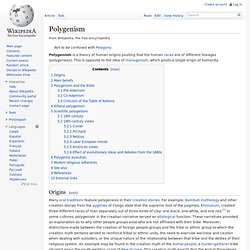
For example, Bambuti mythology and other creation stories from the pygmies of Congo state that the supreme God of the pygmies, Khonvoum, created three different races of man separately out of three kinds of clay: one black, one white, and one red.[1] In some cultures, polygenism in the creation narrative served an etiological function. These narratives provided an explanation as to why other people groups exist who are not affiliated with their tribe. Moreover, distinctions made between the creation of foreign people groups and the tribe or ethnic group to which the creation myth pertains served to reinforce tribal or ethnic unity, the need to exercise wariness and caution when dealing with outsiders, or the unique nature of the relationship between that tribe and the deities of their religious system.
The idea is also found in some ancient Greek and Roman literature. Main beliefs[edit] Pre-Adamism[edit] IQ Testing and Social Policy: Overview. The story of IQ--or Intelligence Quotient--Testing begins around the turn of the century in France.
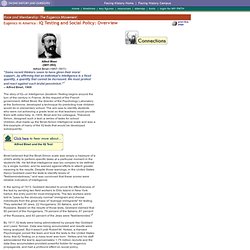
At the request of the French government, Alfred Binet, the director of the Psychology Laboratory at the Sorbonne, developed a technique for predicting how children would do in elementary school. The aim was to identify students who were not achieving a grade level so that teachers could provide them with extra help. In 1905, Binet and his colleague, Théodore Simon, designed such a test--a series of tasks for school children--that made up the Binet-Simon intelligence scale and was a first example of many of the IQ tests that would be developed subsequently. Binet believed that the Binet-Simon scale was simply a measure of a child's ability to perform specific tasks at a particular moment in the student's life. He felt that intelligence was too complex to be defined by a single number, and he warned against efforts to attach greater meaning to the results.
Eugenics. While eugenic principles have been practiced as far back in world history as Ancient Greece, the modern history of eugenics began in the early 20th century when a popular eugenics movement emerged in Britain[8] and spread to many countries, including the United States and most European countries.
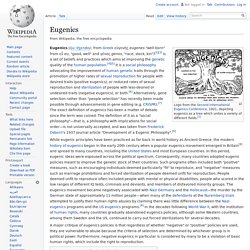
In this period, eugenic ideas were espoused across the political spectrum. Consequently, many countries adopted eugenic policies meant to improve the genetic stock of their countries. Such programs often included both "positive" measures, such as encouraging individuals deemed particularly "fit" to reproduce, and "negative" measures such as marriage prohibitions and forced sterilization of people deemed unfit for reproduction. People deemed unfit to reproduce often included people with mental or physical disabilities, people who scored in the low ranges of different IQ tests, criminals and deviants, and members of disfavored minority groups.
History[edit] Some, such as Nathaniel C. Ethics[edit] Francis Galton. Sir Francis Galton, FRS (/ˈfrɑːnsɪs ˈɡɔːltən/; 16 February 1822 – 17 January 1911) was an English Victorian polymath: anthropologist, eugenicist, tropical explorer, geographer, inventor, meteorologist, proto-geneticist, psychometrician, and statistician.
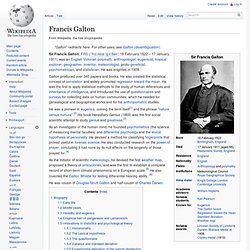
He was knighted in 1909. Galton produced over 340 papers and books. He also created the statistical concept of correlation and widely promoted regression toward the mean. He was the first to apply statistical methods to the study of human differences and inheritance of intelligence, and introduced the use of questionnaires and surveys for collecting data on human communities, which he needed for genealogical and biographical works and for his anthropometric studies. He was a pioneer in eugenics, coining the term itself[1] and the phrase "nature versus nurture".[2] His book Hereditary Genius (1869) was the first social scientific attempt to study genius and greatness.[3] Biography[edit] Early life[edit] Louisa Jane Butler Middle years[edit] Social Darwinism. Social Darwinism is a modern name given to various theories of society that emerged in England and the United States in the 1870s, and which allegedly sought to apply biological concepts of natural selection and survival of the fittest to sociology and politics.[1][2] Social Darwinists generally argue that the strong should see their wealth and power increase while the weak should see their wealth and power decrease.
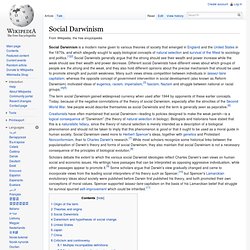
Different social Darwinists have different views about which groups of people are the strong and the weak, and they also hold different opinions about the precise mechanism that should be used to promote strength and punish weakness. Many such views stress competition between individuals in laissez-faire capitalism; whereas the opposite concept of government intervention in social development (also known as Reform Darwinism) motivated ideas of eugenics, racism, imperialism,[3] fascism, Nazism and struggle between national or racial groups.[4][5]